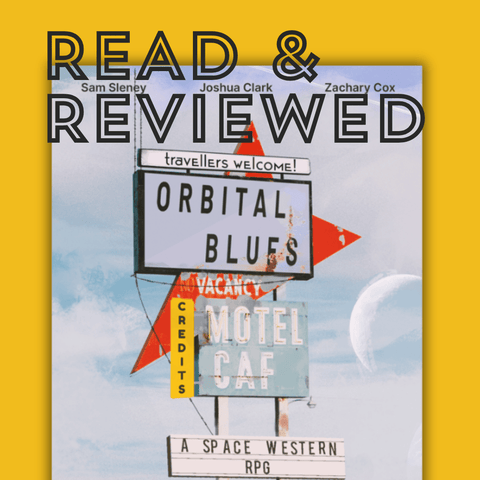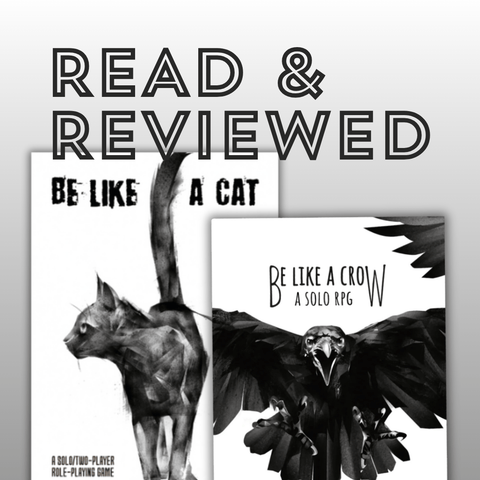by Mark Wallace
Easily the most time-consuming part of character creation in Orbital Blues, Soul Muppet Publishing's 2021 TTRPG of "sad space cowboys," might be the choice of your character's theme song. Do you go with Red Wine Supernova or Champagne Supernova? Chaise Longue or Long Train Runnin'? Is your OC hanging out with SZA's Drew Barrymore or dreaming Swervedriver's 99th Dream? Are you Jamiroquai's Space Cowboy or Sly and the Family Stone's Spaced Cowboy? Is it My G from Aitch and Ed Sheeran or My Old School from Steely Dan? (What do all these songs sound like, anyway?)
That Steely Dan number might not be a terrible choice, actually, considering Orbital Blues's roots in the old-school revival (or whatever else you'd like OSR to stand for). Largely a sci-fi conversion of Soul Muppet's fantasy horror game Best Left Buried (itself descended from Chris McDowall's Into the Odd, via Maze Rats), Orbital Blues places its characters in "the rock and roll future of yesteryear that never was — and nobody wanted." That's outer space, in other words — like with spaceships and stuff.

If that's not enough detail, the hardcover rulebook clocks in at just over 200 pages and lets us know that the game's Frontier Galaxy is a janky 1950s mashup of fraying wires and space-age chrome. The future is "lo-fi, fuzzy, beige sci-fi" after the fashion of Cowboy Bebop, Firefly, or Guardians of the Galaxy.
But if the game's text doesn't go into much detail about just how its galaxy works, that's not cause for complaint. The book provides plenty of rich worldbuilding in the form of its illustrations, and is a pleasure to page through just for the '50s-style adverts, bumper stickers, stat blocks styled like horserace betting slips, and the many retro-future typefaces that pop out at odd angles from the generous margins. (You can thank Josh Clark for the art and Lone Archivist for the layout here.) This is a galaxy of burnt-out neon signs and badly-lit diners, the kind of place you're more likely to find a Polaroid camera or a .38 Special in your wood-paneled spaceship than a lightsaber or blaster pistol.

A Nice Ride
If the setting hooks you, the good news is that the mechanics are just as welcoming. Orbital Blues gives you a more or less standard set of OSR stats: Muscle, Grit, and Savvy get +2, +1, and +0 however you like, and are added to 2d6 on Stat Checks (roll 8+ to succeed). The game also borrows Best Left Buried's cool combat mechanic: roll 3d6 and choose two of those dice as your "to hit" roll, adding the relevant stat to try to meet or beat the enemy's Target Number (usually 8). The third die becomes the damage you do. It's an elegant way to introduce an interesting choice that makes combat more than just rolling and reading the dice.
If Orbital Blues presents a more or less standard OSR chassis, closer inspection reveals some aftermarket narrative components that aren't just bolted on but seem relatively well integrated into the engine of the game.
In addition to their stats, characters have Heart, which doubles as both hit points and as a resource that can be spent to reroll dice, presenting another interesting choice: Do you save your strength to weather an incoming blow, or risk weakening yourself to try to take down the enemy you're facing?
Your sad space cowboy's unique talents are represented by Gambits that provide benefits in various situations, while the more complicated side of their character is represented by Troubles. Troubles not only provide a list of questions to flesh out your character's background both before and during play (e.g., "What scar do you wear with pride?" or "What is your signature hangover cure?"), but incentivize some complicating choices by rewarding characters for doing things like losing their temper, making an outrageous bluff, or failing to prove their superiority.

Saddle Up, Sad Space Cowboy
Throughout, Orbital Blues achieves the feat of hewing fairly closely to its theme: the narrative currency that's provided by Troubles is known as Blues. (Blues can also be gained through a Blues Check, which characters make "whenever something terrible happens to them.")
Blues are not quite experience points, but they do provide the game's engine of advancement. This is also where your theme song comes in. Accumulate enough Blues and you can, once per story arc, declare that one of your Troubles is Brewing: "Your soundtrack plays as you try to assuage your Blues by confronting the source of your Trouble." Mechanically, this means you take half damage for the rest of the scene, and can spend Blues instead of Heart to give yourself a boost. At the end of the scene you reset your Blues to 0 and choose whether to increase a Stat, restore all your Heart, or gain an additional Trouble. Every second Trouble you take also gives you a new Gambit.
Blues, Troubles, and Gambits make for an interesting take on advancement, and Sam Sleney and Zachary Cox, the game's writers, deserve credit for putting a slightly more narrative finish on the Grip, Affliction, and Advancement mechanics from Best Left Buried (written by Cox and Nicholas Spence).

Playing the Blues
With 20 Troubles to choose from, each with five questions and three Blues triggers (and names like Time Behind Bars, Party Animal, or A Higher Cause), Troubles have the flavor of narrative character archetypes, and feel like they could be more central to character creation. In fact, there's a lot that could be rearranged about Orbital Blues. While Soul Muppet has given us what feels like a solid game, in an attractive package whose layout and art are doing a lot of important work, the information design of the game leaves much to be desired. The table of contents is skeletal, and the order in which the rules are presented feels at times somewhat random. Occasional layout glitches can be forgiven, although one prefers not to find them in a $40 book.
There's a way in which the text is almost too well integrated into the book's otherwise impressive visual design: Chapter headings can occasionally be mistaken for yet another worldbuilding illustration, and related material is sometimes found in frustratingly disparate parts of the book. This kind of design approach works for Mörk Borg in part because that's a simpler game: its core rules fit in a run of not even 20 pages. Orbital Blues feels like its organization — and sometimes its explanations — could have used a little more attention.
Still, one mark of a good game is that you're excited to discover new content for it, and that's definitely the case with Orbital Blues. The last several months have seen Soul Muppet release a slipcase with five additional adventure setting zines (previously released digitally as stretch goals for the 2021 Kickstarter), and Afterburn, an expansion that was Kickstarted earlier in 2025 and that features a starship manual, a big sandbox adventure setting, and a Storyteller's Guide.

The OSR Frontier
The Storyteller's Guide should be a welcome addition. The core book provides some useful suggestions and a nicely fleshed-out starter scenario in the Sutler System, where there's plenty of trouble to get into. But giving the characters and plot a long-range engine is left almost entirely to the Storyteller (the game's GM). We're in OSR country, to be sure, where such aids are sometimes looked on as a crutch, but the game seems to be trying to appeal to a broader set of gamers, including those who could use a little more handholding to get on their intergalactic way. A few more pointers from the Storyteller's Guide wouldn't be a bad thing.
If we're in OSR country, though, we're not in too deep. Orbital Blues stakes its claim on an interesting frontier between the OSR and the more narrative flavor of a Powered by the Apocalypse game. The mechanics are simple enough to pick up fast (if slightly hampered by their presentation), the narrative elements present lots of opportunity for fun roleplaying, and the retrofuture vibe and gritty setting pull the whole thing together into an appealing package. So saddle up — your Troubles won't be far behind.

Mark Wallace (he/him) has written about games for Shut Up & Sit Down, Rock Paper Shotgun, and The Escapist, as well as hobbyist publications like The New York Times, GQ, Wired, and many more. Find him on Bluesky at @markwallace.bsky.social.





Comments (0)
There are no comments for this article. Be the first one to leave a message!